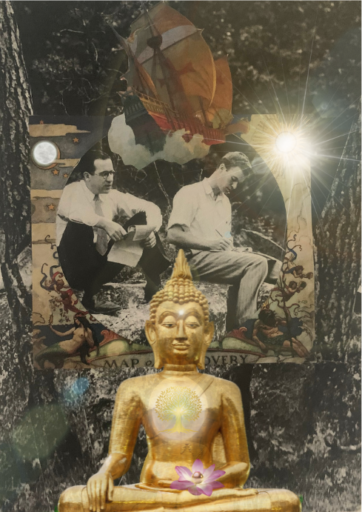True/False
The adolescent is engaged in trying to find the self to be true to.
–D.W. Winnicott
The map is full of rivers to label, mountain ranges,
borders, and blank space. I have been absent.
Now I am making up a test. I write slowly
because I like working alone at my little desk-chair
in the hallway, the building humming around me. A buzz
in the overhead fluorescent distracts my inner narrator,
but she knows all the answers, even how to spell
Himalayan. Yes, at eleven, I am happiest
in the refuge of questions and facts
because a school is both family and city—full of rules
and exceptions. It’s easiest to swallow the story of yourself
assigned by teachers and peers—to live compliantly
between reality and performance. Every student is spy;
I know to avoid the gaze of a passing eighth grader,
but suspect the world is not so tidy as the paired letters
and numbers in the matching columns make it seem.
Halfway through monsoon season, voices spill
from the classroom, startling me with answers
to the very test I’m taking. Am I cheating or being
cheated? Without thinking, I cross to the door
and ask to shut it so I won’t hear. The class watches
me through the ghost breeze as it swings shut.

Paper Stars
were awarded for virtues pinned to the blackboard
I was too nervous for courage (which we’d confused
with bravery) and too shy to demonstrate
compassion, but I was bad at lying and scared of breaking
rules; and integrity, they told us, was honesty
in behavior and speech; I earned stars for obedience
no one told us, integrity is also
wholeness, also soundness,
always be yourself, they said,
as if the self were a single fixed thing
always be true to yourself
by which they inevitably meant
to your better angel, your well-behaved shape
be kind / be competitive at sports
double check your work / act more confident
be happy / prove it / smile and thrive etc.
but if integrity is slippery, I wrote
much later, scaled and permeable
poetry is plaintext escaping
a language full of codes and euphemisms,
brief reports lodged, unswallowed
integrity can’t be learned, a former spy says, only preserved
or stretched—like memory through circumstance
so I try now to account for my persona,
how quietly she sat, curled
around the text, so deep in thought
she often forgot she was playing
a role, gathering intelligence
to map the difficult terrain of our future

Rehearsal
April 2005
The fire alarm—loud and familiar pulse, rumored
all morning—disrupts senior physics. We drop
our pencils and stroll out the emergency exit
into the bright morning, onto the soccer fields,
where dew soaks through our shoes (or is it sun
that warms our shoulders? Pollen that makes us
sneeze? They blur together, all these drills
for a disaster that never arrives, never arises,
though the forever of childhood is full, later,
of endings and vanishings.) Habit sorts us
into alphabetical order—to be counted off
by an English teacher (who will be killed
in an accident not so long after we graduate,
whose drama class has me looking back
at this scene like something from a play:
the whole cast lined up and waiting
to scatter into action or take a final bow).
We stand, not quite still, not quite grown,
and squint at the sun reflecting off the roof
of our school, from which no smoke billows,
through which we will soon process to bagpipes
and advice (though the world will be different
by the time we risk it, a digital gleam.) We wait
for the alarm to be silenced, for the shout
that will summon us back.
Ceridwen Hall: “These poems are part of a longer project exploring parallels between education and espionage—and the identities that both students and teachers assume in order to get through the deep cover op that is the academic semester. You can find more of my work and a blog about creative processes and practices at ceridwenhall.com.”
